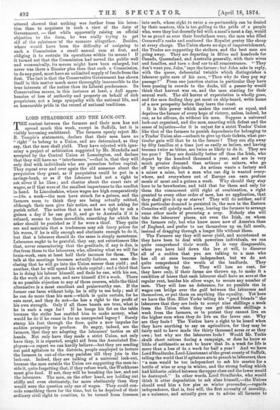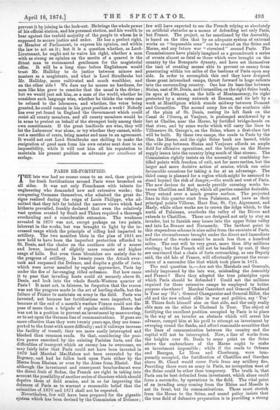LORD STRADBROKE AND THE LOCK-OUT.
THE contest between the farmers and their men has not spread much this week, except in Suffolk, but it is visibly becoming embittered. The farmers openly reject Mr. R. Temple's statements, declare that their men have no " right " to belong to a Union, and are determined, as they say, that the men shall yield. They have rejected with igno- miny a project of arbitration suggested by Mr. Mundella and accepted by the Central Union at Leamington, and declare that they will have no " interference,"—that is, that they will only deal with individuals who are powerless before capital. They repeat over and over again the old nonsense about the perquisites they grant, as if perquisites could be put in a savings-bank, or as if the labourer had not a right to ask silver if he likes ; and chatter about the exact rate of wages, as if that were of the smallest importance to the conflict in hand. In Lincolnshire, where wages are high comparatively —18s. a week—the men have struck for a guinea, and the farmers seem to think they are being actually robbed, although their men give fair notice, and are not asking for parish relief. The notion that a man has a right to ask a guinea a day if he can get it, and go to Australia if it is refused, seems to them incredible, something for which the asker should be punished as if he were a thief. They quite see and maintain that a tradesman may ask fancy prices for his wares, if he is silly enough and obstinate enough to do it, but that a labourer should do the same is simply monstrous. Labourers ought to be grateful, they say, not extortioners like that, never remembering that the gratitude, if any is due, is due from them to the labourers, who, allowing what we will for brain-work, earn at least half their incomes for them. The talk at the meetings becomes actually furious, one man de- ,claring that he will go into the Union sooner than yield ; and another, that he will spend his whole capital ; and a third that he is doing his labour himself, and finds he can, with his son, do the work of six men, and save himself £10 a week. There is no possible objection to any of those courses, while the third alternative is a most excellent and praiseworthy one. If the farmer can farm without help, he is silly to use help ; and if he can do more than his men—which is quite certain, for he eats meat, and they do not—he has a right to the profit of his own strength. Only if all these boasts are true, what is he in such a rage for ? If he bangs his fist on the table because the strike has enabled him to make money, what
would he do if he came in for an unexpected legacy Surely stamp his foot through the floor, quite a new impulse for sudden prosperity to produce. So angry, indeed, are the farmers, that they are adopting the labourers' tactics on all hands. Not only have they made a strict Union, not only have they, it is reported, sought aid from the Associated Em- ployers—a report we can hardly believe—but they are sending out paid agitators to the districts, people employed to lecture the farmers in out-of-the-way parishes till they join in the lock-out. Indeed, they are talking of a universal lock-out, because the men outside the Union are supporting the men in- side it, quite forgetting that, if they refuse work, the Workhouse must give food. If not, they will be breaking the law, and not the labourers. The men, on the other hand, are holding out stiffly and even obstinately, far more obstinately than they would were the question only one of wages. They could con- cede something there for the time, but to be deprived of their ordinary civil right to combine, to be turned from freemen
into serfs, whose right to enter A co-partnership can be denied by their masters, this is too galling to the pride of a people
who, were they but decently fed with a meal's meat a day, would be as proud as ever their forefathers were, the men who filled Cromwell's ranks and scattered the Royalist gentry like sheep at every charge. The Union shows no sign of impoverishment, the Trades are supporting the strikers, and the best men are going away. They are departing in fifties and hundreds for Canada, Queensland, and Australia generally, with their wives and families, and turn a deaf ear to all remonstrance. "They don't want you, John," says the farmer; but John asks in reply, with the queer, deferential twinkle which distinguishes a labourer quite sure of his case, "Then why do they pay my passage ?" From one junction station in particular they have been passing in crowds to the docks, till a passer-by would think that harvest was on, and the men starting for their annual work. The old horror of expatriation is wholly gone, and the men finding they get meat on ship-board, write home of a new prosperity before they leave the coast.
It is this power which makes the contest so equal, and deprives the farmer of every hope of victory, unless, indeed, he can, as he affirms, do without his men. Suppose a universal lock-out organised, and the men, smarting with defeat and the sense of injustice—for it is unjust for a strict Trades' Union like that of the farmers to punish dependants for belonging to a Trades' Union also —submit to give up their tickets, what par- ticular gain will that be to the farmer ? They can slip away by fifty families at a time just as easily as before, and having become twice as bitter, are twice as likely to do it. They are too poor ? They are decidedly better off than the Irish, who depart by the hundred thousand a year, and are in very much greater demand than artisans or miners, who go off by entire ship-loads. An artisan wants a factory and a miner a mine, but a man who can dig is wanted every- where, and everywhere out of Europe can earn profuse meals of meat and a guinea a week. Why should they stay here to be browbeaten, and told that for them and only for them the commonest civi1 right of combination, a right granted to every other order of men, has no application, that they shall give it up or starve ? They will do neither, and if this particular demand is persisted in, the men in the Eastern Counties will quietly melt away, leaving the farmers to arrange some other mode of procuring a crop. Nobody else will take the labourers' places, not even the Irish, on whom the farmers rely, but who know more now of America than of England, and prefer to use themselves up on full meals, instead of dragging through a longer life without them.
The Farmers say they will never yield, and accustomed as they have been to deal with powerless individuals, we can quite comprehend their wrath. It is very disagreeable, when you have laid down the law at will, to discover all of a sudden that you are talking to a man who has all at once become independent, but we do not quite comprehend the wrath of the landlords. They
have nothing to fear. They will lose no rent, for they have only, if their farms are thrown up, to make it a condition of leases that each labourer shall have an acre at the regular rent, besides his silver wage, to secure any number of men. They will lose no deference, for no possible rise in wages can bridge over the gulf between the labourers and themselves, or put them on anything like equality. Yet here we have the Hon. Eliot Yorke telling his "good friends" the labourers that they are fools to accept nine shillings a week from the Union when they can get thirteen shillings a week from the farmers, or to protest they cannot live on the higher sum when they do live on the lower one. Why are they fools ? The Yorkes have a right to be heard when they have anything to say on agriculture, for they may be fairly said to have made the thirty thousand acres or so they own ; but why are the labourers fools ? Would Mr. Yorke skulk short rations during a campaign, or does he know so little of arithmetic as not to know that 2s. a week for life is more than a loss of 4s. a week for half a year ? And we have Lord Stradbroke, Lord-Lieutenant of the great county of Suffolk, telling the world that if agitators are to preach to labourers, then "a man would be too independent to ask his master for a bottle of wine or soup in winter, and the strong feeling which had hitherto Jxist ed between the upper class and the lower would be destroyed." In other words, Lord Stradbroke, who would think it utter degradation to ask alms himself,—the Unions should send him a few pies as winter provender,—regards independence, that is, free will, the first necessity of morality, as a nuisance, and actually goes on to advise all farmers to prevent it by joining in the lock-out. He brings the whole power of his official station, and his personal station, and his -wealth to bear against the tenfold majority of the people to whom he is supposed to secure justice and order. He has a perfect right, as Member of Parliament, to express his opinion, and within the law to act on it ; but it is a question whether, as Lord- Lieutenant, he ought not to waive his right, whether a man with so strong an opinion on the merits of a quarrel is the fittest man to recommend gentlemen for the magisterial office. It will be a long time before Englishmen would trust Mr. Halliday to do justice between miners and masters as a magistrate, and what is Lord Stradbroke but Mr. Halliday, more cultivated and much wealthier, and on the other side ? We dare say he means no hardness, for men like him grow to consider that the usual is the divine ; but we would just ask him, as a man of the world, whether he considers such language wise, whether he thinks the votes can be refused to the labourers, and whether, the votes being granted, he could remain in his great position a week? Nobody has ever yet found in England the Government which could resist all county members, and all county members would be in arms to protest on behalf of the strongest body among their own constituents. If the great landlords are wise, they will let the Labourers' war alone, or try whether they cannot, with- out a sacrifice of rents, bring master and man to an agreement. It would not cost Lord Stradbroke one shilling to make the emigration of good men from his own estates next door to an impossibility, while it will cost him all his reputation to maintain his present position as advocate par excellence of serfage.



































 Previous page
Previous page